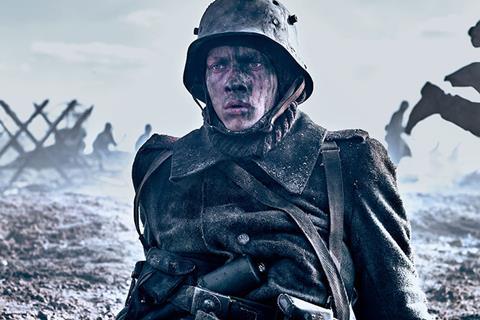Edward Berger explores the enduring horrors of war in his adpatation of the classic WWI novel

Dir. Edward Berger. Germany. 2022. 143mins
Conflict seemingly never ends, and the role of war films has always been to – repeatedly – process the human desire to obliterate ‘the enemy’. (War films were amongst the first ever made, comprising short documentary clips from the Spanish-American War in 1898.) German veteran Erich Maria Remarque, shocked by the so-called ‘war to end all wars’, wrote ‘All Quiet on the Western Front’ in 1928, and it was filmed, winning three Oscars, two years later. Now Edward Berger returns to the German source material, adding some twists and turns, in a wrenching, visceral adaptation of a work that is almost a century old, written when ruined veterans could still hear the sound of the gunfire in their dreams.
Berger brings home the message of all war films in the most straightforward and direct way
Backed and distributed by Netflix, this is the original war epic. There’s no twist; it’s not framed as a one-shot chase film like Sam Mendes’ 1917, a romanticised Joyeux Noel or the cruel life story of a War Horse. Teenagers go off to war; they die, horribly, and they are repeatedly betrayed by their governing classes. Germany’s entry to the International category of the Academy Awards is a tough, accomplished, watch. At home, it will be examined with interest as a long-overdue return to its heritage. Its sacrifice of the family elements of the novel in favour of cross-cutting from the front to peace negotiations works well to give a long film some tension. A tough, endurance test on home screens, where it goes out on the streamer from October 28, it’s a rewarding, if deeply upsetting and at times overwhelming theatrical experience.
Edward Berger (TV series Patrick Melrose, the little-watched Berlinale title All My Loving) ups the ante considerably for this wide-screen spectacle of death and destruction. His over-arching aim is to illustrate the war’s bloody repetitiveness – the back-and-forth nature of this years-long, futile struggle for mere metres of land. Pre-credit, a crane shot lowers onto images of the dead as a boy soldier called Heinrich goes over the top and is immediately killed. His clothes are stripped from his body in a bloody mass of corpses, bagged, washed, altered, and sent back to the next recruit who will – literally – fill his boots. A contrabass is an anachronistic touch but ratchets up the fear of what is to come for the viewer. A new journey has begun.
The boy in the made-over uniform is the film’s central character Paul Baumer (the wide-eyed debutant Felix Kammerer), born in 1899 and on the front by the third year of the war. He and his school friends are filled with fervour – ready to march on Paris! – but they will never advance more than a few metres before diving back into their rat-infested trenches. One by one they die, as a starving Paul somehow manages to survive for 14 months and forms a bond with the older soldier Katczinsky, or Kat (Albrecht Schuch).
Kat is more experienced than Paul, and comes from a different social class – he can’t read – but they form a desperate bond; dreaming of home, even if they know by now that victory is impossible. Brief moments on a farm in the Champagne area are immediately corrected when Paul and Kat find an entire convoy of new recruits gassed to death. Germany will soon be empty, they sigh.
Berger spares the viewer nothing as Paul’s innocent blue eyes gradually haze over into a battle-hardened stare. Men die brutally before they have had a chance to live, sometimes by their own hands. He spends a night in a filthy trench, watching a man he has repeatedly stabbed gurgle and die.
What stops All Quiet from becoming too sad, too cruel, to watch is the cross-cut to Daniel Bruhl’s character, the liberal politician Erzberger, as he tries to sue for peace against the wishes of a vainglorious military, personified by General Friedrich (Devid Striesow) who insists on repeatedly sending his troops to certain death. The defeat, when it comes, will be on French terms and, as Erzbeger is given 72 hours to sign, Friedrich sends Paul out again in a fruitless sally.
The film touches lightly on the terms of the Armistice and the tensions it will create in the future, as we hope against hope for a life for Paul that he seems to have given up on. Berger is keen to show the class differences between the ruling elite and the kids they sent out to die, something that was interchangeable between sides and, for that matter, between wars.
Shot in the Czech Republic, All Quiet is gruellingly realistic: impressively-staged battle sequences follow each other with the sounds of conflict booming in a cinematic bombardment. With the ongoing brutal struggle in Ukraine over territory, Berger brings home the message of all war films in the most straightforward and direct way — the cost in human life, yes, but also, of our collective humanity.
Production company: Amusement Park Film
Worldwide distribution: Netflix
Producers: Malte Grunert, Daniel Dreifuss, Edward Berger
Screenplay: Edward Berger, Lesley Paterson, Ian Stokell, based on the novel by Erich Maria Remarque
Cinematography: James Friend
Production design: Christian M. Goldbeck
Editing: Sven Budelmann
Music: Volker Bertelmann
Main cast: Felix Kammerer, Albrecht Schuch, Aaron Hilmer, Moritz Klaus, Thibault de Montalembert, Daniel Brühl, Devid Striesow























